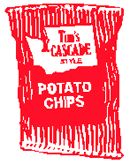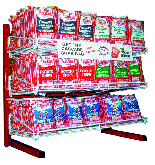
Tim's Cascade Style Potato Chips
For 10 years, Tim's Cascade Style Potato Chips has filled a niche in western Washington for snack enthusiasts with a craving for kettle-cooked chips made in small batches with unique flavors. The back-to-basics company, owned by Tim Kennedy, who brought his expertise and recipes with him from Texas, now employs 55 people and makes annual sales of about $8 million. Tim's Cascade sells throughout the Pacific Northwest and to distributors in California, Alaska, Hawaii, Japan, Hong Kong, and through a separate joint venture in China. However, the snack industry remains a regional one, with 80 percent of the business in Washington. The challenge for Tim is to produce a premium product at a price comparable to the national brands.Cutting Costs
The key to success, of course, is cutting costs. From a modest beginning, Tim's Cascade started by making sensible investments in older, discarded equipment and made simple modifications to upgrade and update it. As the company grew, it was able to replace older equipment with more efficient and easier-to-clean appliances. Many cost-saving measures also provide environmental benefits. In a truly innovative concept, the company switched to a glue bottom box design that can easily be popped open with one hand, saving labor and providing a sturdier, reusable shipping container. A five-cent-per-box deposit encourages the independent distributors to return the boxes after use. Most can be reused five or six times. In another innovation, holes were designed in the sides of the boxes to reveal package labeling, eliminating the need to add labels to the outside of the boxes. This innovation alone saved about $60,000 annually.
Other cost-saving moves included replacing wood shipping pallets with more durable lightweight plastic pallets, and designing a treatment system to remove peanut oil from discharge water so that the oil may be sold to a renderer for use in dog food and cosmetics. The company also found that by adding additional incoming water lines and reducing the diameter of cleanup lines, they could increase water pressure and actually reduce the volume of water needed to wash equipment. Investing in a steam cleaner also reduced water usage and the amount of time spent on cleaning.

Tough Standards
With all of the efforts to reduce cost, one area where Tim's Cascade can little afford to cut corners is in cleanliness and safety. Tim maintains tough hygiene standards for his facilities. But he also works alongside the employees and involves them in the problem-solving process. With an open-door policy, the facility is ready for visits from regulators at any time, day or night. For this, Tim has consistently received praise from inspectors, who often refer employees from other food processing companies to visit Tim's Cascade and learn by example. He also invites the public to visit, and feels a strong commitment to working with the community.Beyond the Call of Duty - Doing the "Right Thing"
At times, Tim's Cascade has taken advantage of opportunities to do the right thing even when it appeared to have no measurable economic benefit. For example, when a vendor could no longer accept polypropylene bags for recycling, Tim's Cascade was able to donate them to a large suburban mall where they can be reused as trash can liners. And instead of throwing away rolls of obsolete packaging film, the company donated them to local schools in their art projects.As Tim views it, even small businesses have a responsibility to do the "right" thing, even without the expectation of receiving a financial return. He believes that small business cannot afford to cut corners when it comes to such issues as the environment, health care, and supporting the community. In general, the consumer expects that companies will do what's right, so businesses should not expect kudos beyond their own satisfaction.